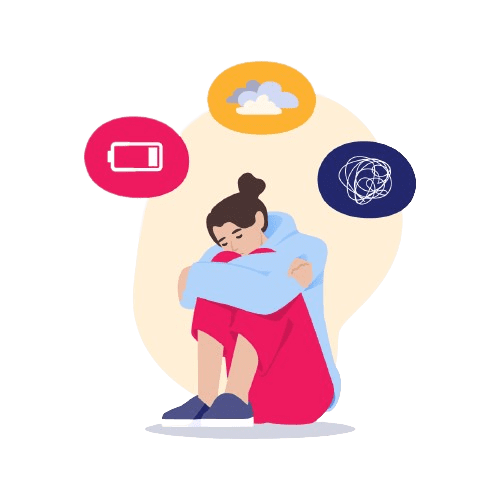Dementia Assessment
3 Min Free Dementia Assessment
What is Dementia?
Dementia is a general term used to describe a group of symptoms associated with a decline in cognitive function severe enough to interfere with daily activities and functioning. It is not a specific disease but rather a syndrome caused by various underlying conditions or diseases.
The most common cause of dementia is Alzheimer’s disease, accounting for around 60-80% of cases. Other causes include vascular dementia, Lewy body dementia, frontotemporal dementia, and mixed dementia. Dementia typically affects older individuals, although it is not a normal part of aging.

Symptoms of Dementia
The symptoms of depression can vary from person to person, but they often include:
- Memory loss
- Difficulty with problem-solving
- Language problems
- Confusion and disorientation
- Impaired judgment
- Changes in mood or behavior
- Withdrawal from social activities
- Repetitive behaviors
- Difficulty with coordination
- Inability to recognize familiar objects
- Changes in sleep patterns
- Incontinence

Who Can Benefit From This Dementia Assessment?
The Dementia Assessment can benefit a wide range of individuals and groups involved in the identification, management, and support of individuals with dementia.
Firstly, individuals experiencing cognitive changes or concerns can benefit by gaining awareness of potential signs of dementia and being prompted to seek appropriate medical evaluation and early intervention. Family members and caregivers can benefit by gaining knowledge and understanding of the symptoms, challenges, and care needs associated with dementia, enabling them to provide informed support and access available resources. Healthcare professionals can benefit by using the assessment to aid in evaluating and diagnosing dementia, developing personalized treatment plans, and providing guidance to patients and their families.
Furthermore, researchers and academics can benefit from standardized measures to assess cognitive function, track symptom progression, and evaluate the effectiveness of interventions, contributing to advancements in dementia research and care practices. Overall, the assessment plays a vital role in promoting early detection, comprehensive care, and improved outcomes for individuals with dementia and their support networks.
Types of Dementia Assessment
Laboratory Tests
Blood tests may be conducted to identify underlying conditions that can cause dementia-like symptoms, such as vitamin deficiencies, thyroid dysfunction, or infections. These tests help rule out reversible or treatable causes of cognitive impairment.
Functional Assessments
Functional assessments evaluate an individual’s ability to perform daily activities independently. They assess areas such as self-care, household tasks, and financial management, providing insight into the impact of cognitive decline on daily functioning.
Cognitive Screening Tests
These brief screening tools, such as the Mini-Mental State Examination (MMSE) or the Montreal Cognitive Assessment (MoCA), provide a quick assessment of cognitive function, including memory, attention, language, and executive functioning.
Neuropsychological Testing
These comprehensive assessments involve a series of standardized tests and measures that evaluate multiple cognitive domains in detail. They provide a more in-depth assessment of memory, attention, language, visuospatial abilities, and other cognitive functions.
Brain Imaging
Neuroimaging techniques like magnetic resonance imaging (MRI) or computed tomography (CT) scans can help detect structural changes or abnormalities in the brain that may contribute to dementia. These imaging tests provide valuable information about the brain’s structure and can help differentiate between various types of dementia.
Behavioral & Psychiatric Assessments
Assessments focused on evaluating behavioral and psychiatric symptoms associated with dementia, such as depression, anxiety, agitation, or psychosis. These assessments help determine the presence and severity of behavioral and psychological symptoms, guiding treatment planning and interventions.
Treating Dementia
Treating dementia involves a multifaceted approach aimed at managing symptoms, supporting individuals and their caregivers, and improving overall quality of life. While there is no cure for most forms of dementia, various strategies and interventions can help in the management of the condition. Here are some common approaches used in dementia treatment:
- Medications: Medications may be prescribed to manage specific symptoms associated with dementia, such as memory loss, cognitive decline, mood changes, or sleep disturbances. These medications can help slow down the progression of symptoms or provide temporary relief.
- Cognitive Stimulation: Engaging in activities that stimulate the mind and memory, such as puzzles, games, or reminiscence therapy, can help maintain cognitive function and promote mental well-being.
- Behavioral Interventions: Approaches like behavior modification, structured routines, and environmental modifications can help manage challenging behaviors associated with dementia, reducing agitation, aggression, or wandering.
- Psychoeducation and Support: Providing education and support to individuals with dementia and their caregivers is essential. Psychoeducation helps individuals and their families understand the progression of the disease, cope with changes, and learn effective communication and caregiving techniques.
- Occupational Therapy: Occupational therapy focuses on maintaining independence and improving functional abilities. Occupational therapists can help individuals with dementia enhance their everyday living skills and adapt their environment to promote safety and engagement.
- Social Engagement and Support: Encouraging social interaction and participation in social activities can improve overall well-being and reduce feelings of isolation. Support groups for individuals with dementia and their caregivers provide emotional support, information sharing, and a sense of community.
- Caregiver Support: Supporting caregivers is crucial in dementia treatment. Providing respite care, counseling, and caregiver training can help reduce stress, enhance coping skills, and prevent burnout.
- End-of-Life Care: In advanced stages of dementia, palliative care or hospice care may be recommended to provide comfort and support for individuals and their families.
It’s important to have a personalized and comprehensive treatment plan tailored to the individual’s specific needs and stage of dementia. Healthcare professionals, including neurologists, geriatricians, or dementia specialists, play a crucial role in coordinating and providing appropriate care and support throughout the course of the disease.

